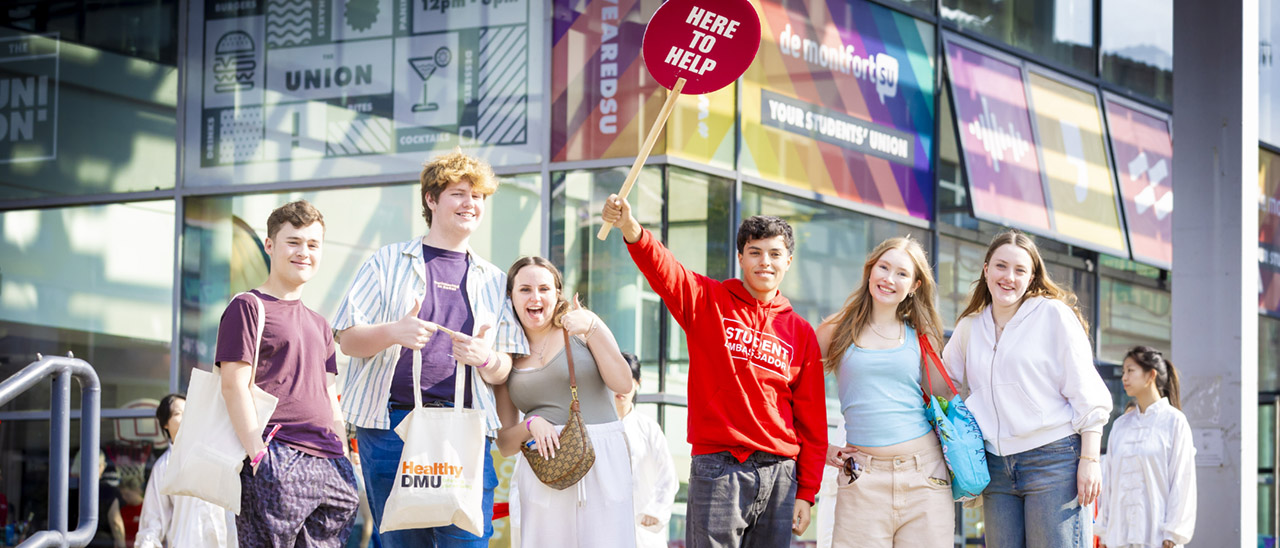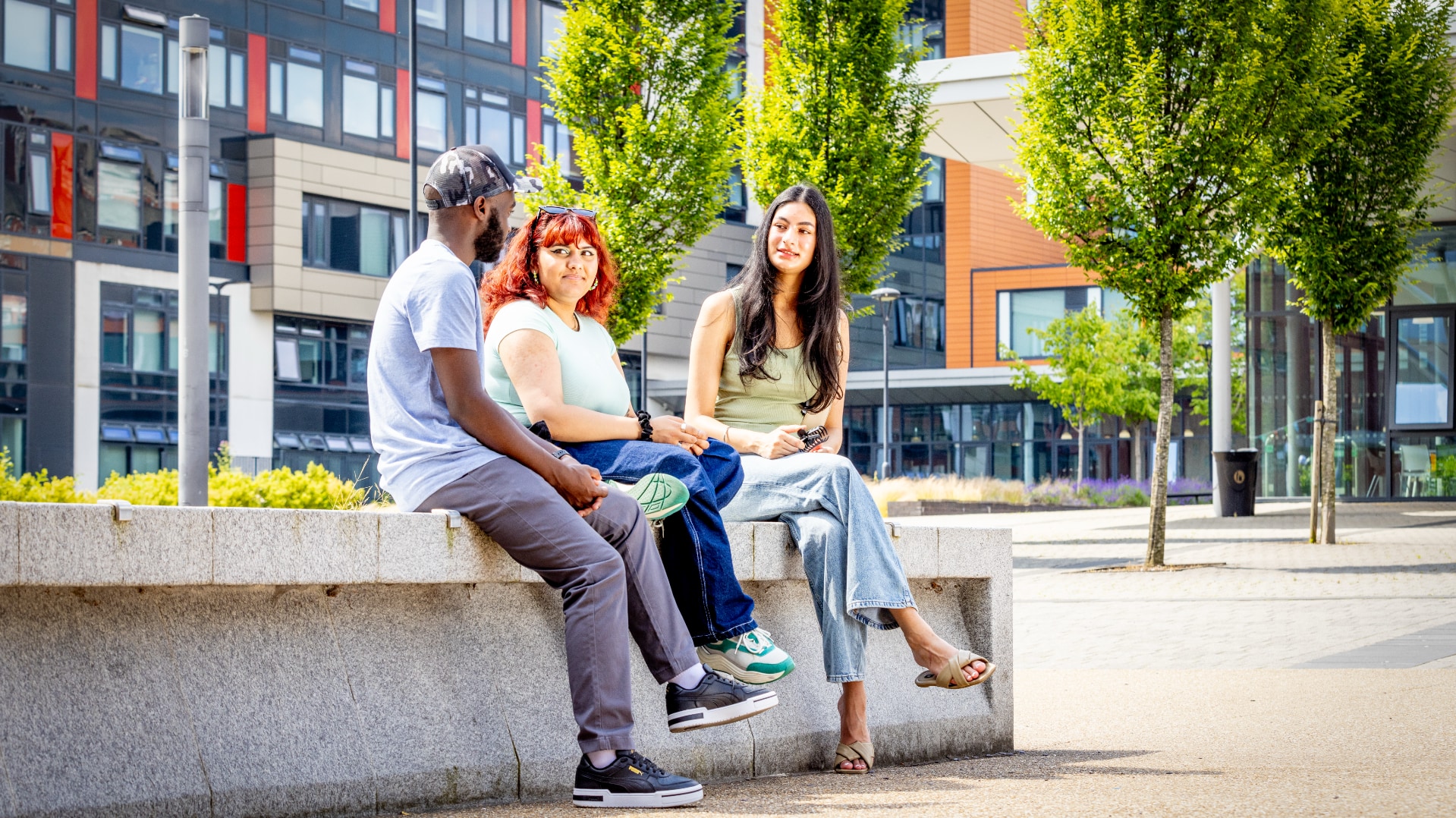After receiving your acceptance letter
Congratulations on being accepted to study at DMU! Before you travel to the UK, there are a few important things to take care of, including visas, healthcare, support services, and accommodation. Completing these steps in advance will help ensure a smooth arrival, a successful start to your studies, and a positive exchange experience.
1. Visa and Entry Requirements
Full academic year students
All students coming to study on exchange at DMU, for the full academic year are required to apply for a Student Visa in order to enter the UK.
All students studying in the UK for 6 months or longer (Full academic year) will need to apply for a visa under the Student route. Individuals will need to demonstrate that they meet specific requirements. Guidance from DMU regarding applying for a student visa from outside of the UK can be found here. Full details are also available on the UK government website.
A few weeks after receiving this acceptance letter, you will be emailed a Confirmation of Acceptance for Studies (CAS) once your application has been processed by the university Admissions Team. This is required for you to apply for your visa and is likely to be received by mid- July at the latest. Please note, applying for a visa can take several weeks so please make sure you do this as soon as possible after receiving your document.
You must get your passport stamped by a Border Force Official on arrival to the UK as this will validate your visa. Do not enter through an eGate as this means your passport will not be stamped and you may need to re-enter the country to validate your visa.
Further support
- UK Council for International Student Affairs (UKCISA) guidance regarding Student route eligibility and requirements can be found here. Advice on making a Student route visa application can be found here.
- If you wish to speak to an expert, you may also contact the UKCISA Student Advice Line on +4420 7788 9214 which is open at the following times: Monday to Friday (except for public holidays): 1.00pm to 4.00pm (UK time)
- The latest information about visas and immigration can be found on the Home Office website.
- For visa enquires, you can contact visaadvice@dmu.ac.uk. Please quote your name and student reference
number.
Semester only students
The guidance below applies to incoming students coming to study on exchange at DMU for Semester 1 (Autumn/Fall) term (i.e., less than 6 months).
The easiest way to check visa and immigration requirements for your nationality and duration of study is by visiting the UK government website. More information about visas can also be found on DMU’s website.
Non-visa nationals
If you are a non-visa national (i.e. your nationality does not appear on this list), it is not compulsory to apply for entry clearance before you travel, as you can enter the UK as a visitor. If you’ve previously been refused entry to the UK or have a criminal record, you may want to apply for a Standard Visitor visa (even if you do not need one).
Students who are nationals of Japan, South Korea, United States of America, EEA and Switzerland are also permitted to use the eGates for entry into the UK.
Electronic Travel Authorisation
From 2025, an Electronic Travel Authorisation (ETA) is mandatory for all non-visa nationals travelling to the UK. This includes nationals of the USA, Canada, Australia, Japan, South Korea, EEA countries, and Switzerland. To find out if you require one and how to apply by visiting the Home Office webpage here.
The ETA must be obtained before travel and is valid for two years or until your passport expires, whichever comes first. You can apply for an ETA via the UK government website. As of 2025, the fee is £16.
Entering the UK as a non-visa national
Use of eGates
The use of eGates to enter the UK as a visitor will mean that you do not receive a stamp in your passport as you do not have to see a Border Force Officer in order to use one. Following using the eGates however, you will be permitted to enter the UK as a visitor for a period of six months. In order to use an eGate, your passport must have a biometric symbol on the cover.
It is important that you retain some form of evidence of your date of arrival in the UK if you use the eGates in this way, such as an e-ticket or paper or electronic boarding pass. This will help you to remember the exact duration of your six-month stay and you will be required to provide this evidence to DMU.
If you do not use the eGates, you can apply to enter the UK as a visitor on arrival at the port of entry and will need to produce all the documents to support your application to a Border Force Officer when you arrive at the port of entry in the UK.
Visa nationals
Individuals who are visa nationals will need to apply for a Standard Visitor visa. There is a fee for this application and the information requested for this process can be found using the link above.
It is recommended for all students to travel with the documents confirming the reason for your travel in your hand luggage, including your acceptance letter to DMU, financial evidence etc to present at the UK border if required.
Further support
- Students can find out whether a visa is required and the rules pertaining to Visitor rules or the Standard Visitor visa (such as what activities you are and are not allowed to do) here.
- UK Council for International Student Affairs (UKCISA) guidance pertaining to entry as a visitor or Standard Visitor visas is also available here.
- If you wish to speak to an expert, you may also contact the UKCISA Student Advice Line on +4420 7788 9214 which is open at the following times: Monday to Friday (except for public holidays): 1pm to 4pm (UK time)
- The latest information about visas and immigration can be found on the Home Office website.
- For visa enquires and information contact our Visa advice team, stating your reference number and duration of stay via visaadvice@dmu.ac.uk.
2. Health and insurance
Full academic year students
As part of the process of applying for a Student Visa you’ll need to pay the Immigration Health Surcharge, so that you can access the services provided in the UK by the National Health Service (NHS). You can calculate how much you’ll need to pay by using the Home Office Immigration Health Surcharge tool.
National Health Service (NHS)
The NHS is the system of public healthcare in the UK. You can find detailed information about how the NHS works from the UK Council for International Student Affairs (UKCISA), including information about Accident and Emergency (A&E), prescriptions and hospital appointments. Comprehensive information is also available on the NHS website.
Please note that, even if you are able to use access free NHS services, you will still need to pay for certain services, such as dental treatment, eye tests and prescriptions.
Register with a doctor
Once you’ve registered onto your course, it’s important to register with a doctor so that you can access medical care during your studies. If you have not done so, you may experience delays in accessing medical care when you fall ill. The doctors working in health centres are frequently referred to as GPs (General Practitioners). De Montfort Surgery is on the university campus and provides healthcare for local students and residents. If you live within its catchment area you can register online.
Semester only students
Some treatment provided by the UK’s National Health Service (NHS) is free for everyone, including accident and emergency services (but not follow-up treatment, or admission as an in-patient to hospital) and Sexual Health clinics. Outside of this, you should ensure that you have adequate medical insurance to cover medical costs if you fall ill. If you already have medical insurance in your home country, check whether you can extend it to cover your stay in the UK. You could also look at options available from UK insurers.
We also recommend that you purchase contents insurance to cover valuables and personal possessions during your time in the UK. Endsleigh provides specialist insurance for students.
Students from the EU or Switzerland
- If you are visiting the UK from an EU country or Switzerland and you fall ill or have a medical emergency during your temporary stay in England, you can use a valid EHIC issued by your home country to access healthcare.
- Your EHIC also covers you for the treatment of pre-existing medical conditions and for routine maternity care, provided the reason for your visit is not specifically to give birth or receive treatment.
- The EHIC is not an alternative to travel insurance. It will not cover any private medical healthcare, being flown back home, or lost or stolen property.
3. Disclosures and support at DMU
Our Disability Advice and Support (DAS) Team and Mental Health Inclusion Team are to help all students before and during their time at DMU. If you are applying to study on exchange with us, we recommend you let us know of any reasonable adjustments you may require as far in advance as possible so we can work with you to make necessary arrangements.
If you have a medical condition, disability or mental health need that may affect your studies or require reasonable adjustments, we recommend disclosing this confidentially in advance so that the appropriate support can be put in place. Disclosures are handled sensitively, and support is tailored to your individual circumstances.
Once you have received your acceptance letter (and student number), please use the following link to share any disclosures with the Disability Advice and Support team by completing the student support consent form. You can also find more information and guidance on the DMU website.
Accessing support during your studies
DMU offers a wide range of academic and wellbeing support services that are available to all students, regardless of whether they have made a formal disclosure. These include:
- Academic support, including library and study skills help
- Mental health and wellbeing services through Healthy DMU
- One-to-one guidance, workshops and mindfulness sessions
Further details can be found on the Healthy DMU webpage.
Emergency and on-campus contacts If you need urgent help while on campus, DMU Campus Security operates 24 hours a day and can assist with emergencies, welfare concerns or lost property. They can be contacted on: +44 (0)116 257 7642
In an emergency off-campus, you can call 999 to reach the police, ambulance or fire services For general support and advice during your studies, students can also contact their Faculty Advice Centre or the Student Union (DSU).
4. Housing and accommodation
Exchange students at DMU typically reside in Castle Court or Bede Hall halls of residence. However, depending on availability, rooms maybe available in other halls close to campus. While accommodation is not guaranteed, there is generally good availability if students complete their applications by the given deadline.
All of our halls are self-catered and fully furnished, offering shared kitchens, laundry facilities and internet access. With on-site or on-call security, halls also have on-site managers, CCTV and/or electronic door entry systems.
Rooms are fully furnished and bedding packs are provided for international students on arrival. All halls are secure, with security cameras and electronic door entry. Prices and contract lengths for academic year 2025-26 can be found here. The price of the accommodation is inclusive of bills and will depend on the size of the room.
Important
Full year students: Please wait to receive an automatic email from the DMU Accommodation Office, including the login instructions for the booking system, prior to taking any further steps. We recommend you look at all the options and consider alternatives in case your first choice is full – all rooms are available on a first-come, first-served basis. View this video on how to book accommodation to learn more.
If you experience any issues or have any questions regarding university accommodation, the DMU Accommodation Office can be contacted via email accommodation@dmu.ac.uk or by phone (0116) 257 7577.
Semester only students: After receiving your acceptance letter, in order to book your accommodation, please email the DMU Accommodation Office stating your full name, that you are an exchange student for Autumn or Spring, the student reference number on the top of your acceptance letter and your planned duration of stay.
If you experience any issues or have any questions regarding university accommodation, the DMU Accommodation Office can be contacted via email accommodation@dmu.ac.uk or by phone (0116) 257 7577.
Payment
Accommodation is paid for in one instalment – date will be confirmed with you upon booking. A payment is also payable upon booking which is used as an advanced payment on rent.
Private accommodation
If you choose not to book accommodation through DMU, please make sure you check the total price for your accommodation and consider your options carefully before signing a contract. You should view properties carefully and make sure the accommodation is suitable. Never sign a contract or other documents without reading and understanding what you are agreeing to. The DSU Advice team provides a checklist and a contract checking service to students moving into private accommodation. We advise you to get their opinion on the contract before signing anything.
SULETS
SULETS is a lettings agency jointly run by the students’ unions of DMU and the University of Leicester. They can help you find high-quality, affordable, private rented accommodation close to DMU. Visit their website or contact them on +44 (0)116 467 0315 for more information.
Arriving in the UK & Life at DMU

This section will help you get settled, find the support you need, and start making the most of your time at DMU.
Incoming Exchange Student Orientation and Events
The Global Mobility Office (DMU Global) runs orientation and social events for exchange students, beginning with a mandatory session before teaching starts. Activities may include campus tours, cultural visits and social gatherings, with full details shared directly by email.
The first day … I was entirely alone, I realised that I was surrounded by people willing to help me, that made me feel more included in everything and made it more easier for me to adapt to all the differences. DMU helped me approach my studies differently and I gained a practical perspective of what I had learnt.

Leire
University of Deusto, Spain
All of my amazing experience in the UK was thanks to my sweetest friends and teachers. Everyone is so helpful and supportive for the people who need a help, so do not afraid to ask for a help. They will kindly help you.

Shuta
Yokohama City University, Japan
Have more questions? Here are some FAQs…
Will there be other welcome events I can join?
Yes. Alongside exchange-specific events, you can take part in International Welcome Week and the Welcome Festival, which include advice sessions, tours, fairs and social activities.
How do I complete registration and access my timetable?
You will need to complete pre-registration on campus when you arrive at DMU. Once completed, you’ll have access to your DMU email, timetable, student ID card and online learning tools. Your Faculty will also send induction details over before you arrive.
What support is available for international students?
The International Student Support team provides guidance on arriving in the UK, including how to travel to DMU and the free Heathrow airport pick-up service. They also offer advice on living in the UK, the i-Buddies mentoring scheme, and the Explore UK trips.
All international students can participate in English language sessions offered by English for Academic Success (EfAS).
How can I get involved in student life?
You can join student societies and sports clubs through the DSU, take part in sustainability projects via the SDG Hub, explore opportunities at the Careers Hub, and join language classes during your stay.
Key contacts
To support you throughout your exchange, the following list outlines who to contact for specific queries and services during your time at De Montfort University.
Global Mobility Office (Student Exchange Team)
Email: studentexchange@dmu.ac.uk
Phone: +44 (0)116 257 7613
DMU Campus Security
24-hour assistance for emergencies, welfare concerns, or lost property
Phone: +44 (0)116 257 7642
Visa and Immigration Advice
Email: visaadvice@dmu.ac.uk
Accommodation (DMU Halls of Residence)
Email: accommodation@dmu.ac.uk
IT Services (ITMS)
Email: servicedesk@dmu.ac.uk
Website: IT Support
Healthcare and NHS Access
Local GP: De Montfort Surgery – Register Online
General NHS Info: www.nhs.uk
DMU Faculty Advice Centres – Student Advice Centres
International Student Support – DMU International Student Support
Healthy DMU – Health and Wellbeing Support
DMU Disability Advice & Support – Disability Support
